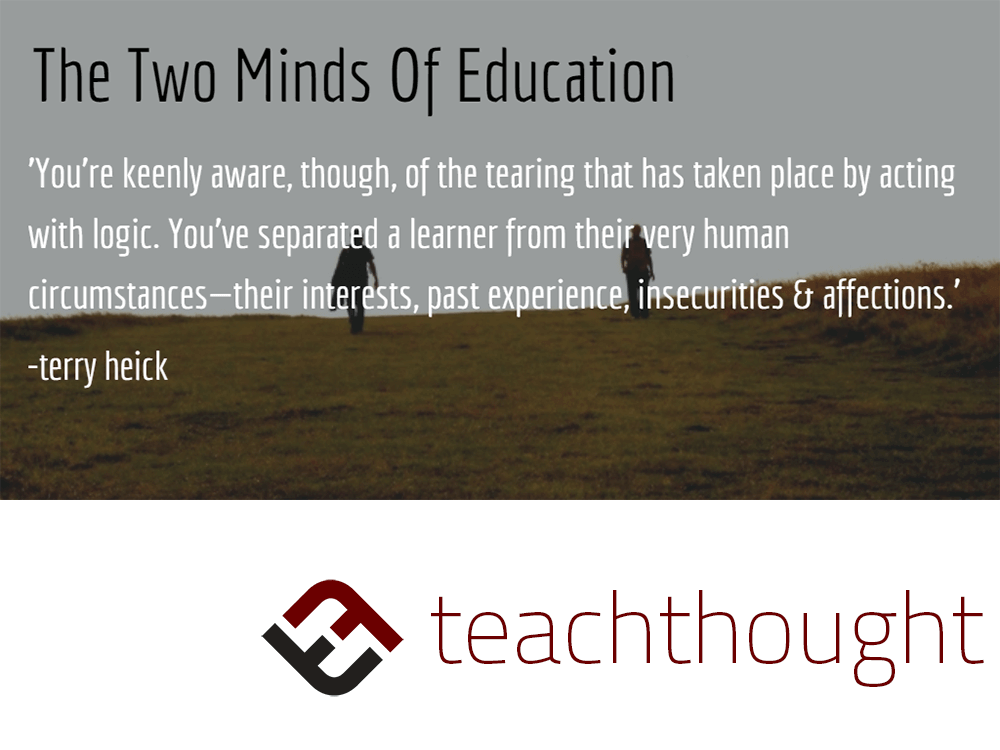The Two Minds Of An Educator
The need to be rational collides with the enormous complexity and scale of the circumstances teachers face.

All Educators Have Two Minds
by Terry Heick
In his essay Two Minds, Wendell Berry, unsurprisingly enough, offers up two tones of thought produced by two kinds of ‘mind’—Rational, and Sympathetic.
One is driven by logic, deduction, data, and measurement, the other by affection and other wasteful abstractions—instinct, reverence, joy, and faith. These minds struggle for to manifest in our collective behavior. That is, they both seek to control our actions–what we say and do.
Berry explains their distinctions:
“The Rational Mind of is motivated by the fear of being misled, of being wrong. Its purpose is to exclude everything that cannot empirically or experimentally be proven by fact.
The Sympathetic Mind is motivated by fear of error of a very different kind: the error of carelessness, of being unloving. Its purpose is to be considerate of whatever is present, to leave nothing out.”
It’s no surprise that these two minds exist in education as well. These are instincts you’ve likely had as an educator—a teacher, administrator, developer, or designer. Probably as a parent too if you have children. The need to be rational and deductive and strategic colliding with the enormous complexity and scale of the circumstances you face.
You’re told to be data-based—that is, to design learning experience with ‘strategies’ that are suggested by some measurement you’ve taken.
You might plan lessons and units by asking yourself, why this instructional strategy? Why this assessment form? Why group at this point in the lesson rather than that point? Why this standard with this novel?
This is your Rational Mind.
But your Rational Mind is servant to another kind of thinking—in fact, is roused and spurred by a kind of insecurity that realizes that unmistakable importance and coinciding impossibility of what you’ve made it your life’s work to do: Teach dozens and dozens of other human beings what they need to know to about (insert your content area here).
The Rational Mind (the same mind that drives policies and standards) wants to parse that task–to respond with logic. Preemptively, strategically, and analytically.
So rather than worry that this student can’t read and this student is a brilliant artist ready for a professional mentor to foster his gift and this student needs both a hug and self-knowledge more than content knowledge, you respond analytically. Your Rational Mind takes over.
You stare at standards and bar graphs and skim books by Marzano and Hattie that list the instructional strategies that their Rational Minds say will work. You listen to your colleagues, your instructional coach, and anyone else willing to offer advice. Then you teach, assess, reteach, re-assess, remediate, extend, and move on.
You’re keenly aware, though, of the tearing that has taken place by acting with logic. You’ve separated a learner from their very human circumstances—their interests, past experience, insecurities, and affections.
Academic content from their native schema.
Proficiency from curiosity.
Scientific concepts from the application of science.
Reading level from the love of reading.
The Rational Mind necessarily excludes curiosity, love, affection, and joy because they are inherently irrational. We live in an age of information that itself proceeds an Age of Enlightenment. By design, data and rationality can’t tolerate abstraction and humanity or they’d shake themselves apart in confusion.
But this requires an adjustment on our part. We have to stop being obstinate to what we increasingly see in our students. Apathy. Distraction. Superficiality.
As an industry, we are currently not just driven but dangerously preoccupied with research and science and that which is measurable and observable, having ridden our profession of superstitions like ‘patience,’ ‘self-knowledge,’ and ‘community.’
We leave it up to teachers to buffer the collision between students from policies, or sterile academic standards with communities that need more than proficiency from students. But if we are “considerate of whatever is present” and want to “to leave nothing out,” we can now see that pure Rationality isn’t fully a ‘mind,’ but an instinctive reaction to the scale of our task.
A challenge for you and I then may be to elevate teaching beyond singularities through a kind of marriage–joining our Rational and Sympathetic mind into something inclusive and awake and whole.
Always insisting, no matter what, that we don’t resort to Rationality or even Sympathy, but rather act as ‘whole teachers’ in every single one of our interactions with and analyses of students, and in doing so model for them the significant practice of being human.
Image attribution flickr user NASA Goddard Space Flight Center; Becoming A “Whole Teacher”
